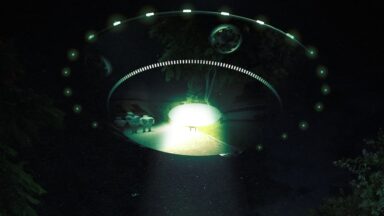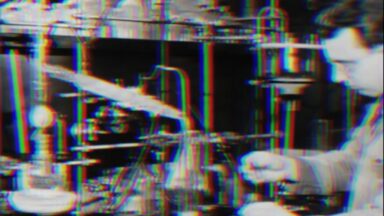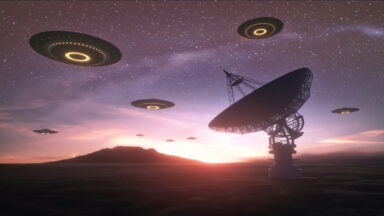Scientific Study Says Octopuses May Have Come From Outer Space
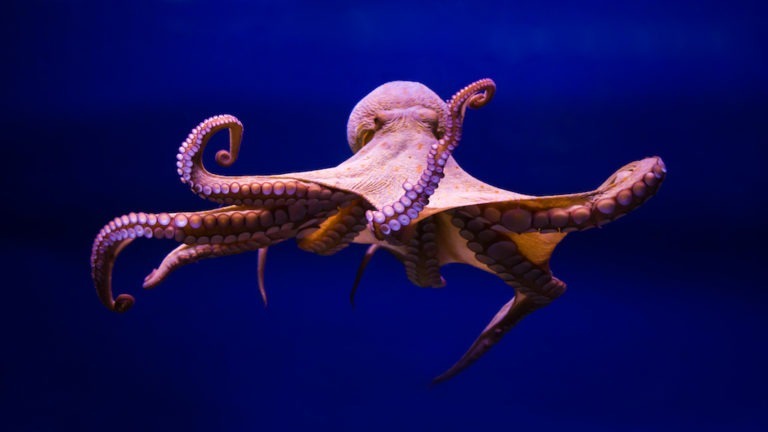
Science fiction often portends scientific discoveries, and now it seems H.P. Lovecraft was ahead of his time when he conceived of the cosmic cephalopod, Cthulhu. Okay, maybe Cthulhu doesn’t exist, but a new scientific paper proposes that cryogenically preserved squid and octopus eggs may have seeded our planet via interstellar asteroids, inevitably leading to more complex, intelligent life on Earth.
Cephalopods, the organisms that include octopuses, squid and cuttlefish, are strangely intelligent and anomalous animals. Able to edit their own RNA, solve puzzles, and short circuit light bulbs with a carefully directed stream of water, these bizarre invertebrates have baffled scientists and even led some to believe they are sentient creatures.
In fact, a recently published New York Times best-selling book makes a strong argument, based on some very convincing anecdotal and scientific evidence, that cephalopods are intelligent, conscious creatures.
This would all seem to make sense when combined with a newly published paper based on the famous theory of panspermia proposed by Cambridge scientists Fred Hoyle and Chandra Wickramasinghe, known as the H.W. Thesis of Cosmic Biology. The theory posits that space-hardy bacteria, viruses, and organisms originate near the galactic center before hitching rides on comets, and subsequently seeding life on rocky planets like Earth.
Though it sounds far-fetched, there is a precedent, most notably seen in tardigrades, the micro-animals proven to be capable of surviving in the vacuum of outer space.
The thesis comes from Hoyle and Wickramasinghe’s rejection of the commonly held theory that abiogenesis, or the first origins of life on Earth, spontaneously occurred in hydrothermal vents in deep sea trenches. Instead they argue that a series of evolutionary phases coincide with instances of comets and meteorites raining down on our planet.
Wickramasinghe and 32 of his co-authors say these bombardments coincide with “extinction-diversification evolutionary boundaries.” In other words, mass extinction events took place upon impact of these cometary bombardments, whereupon the life that survived became more diverse and newer, more complex lifeforms popped into existence.
But how do these species become more diverse? From retroviruses, capable of altering the genetic makeup of the organisms they infect. These retroviruses are the sturdiest part of the argument as they are one of the clearest instances of “horizontal gene transfer” seen in nature.
These retroviruses started appearing and evolving in conjunction with the species they infected around the Cambrian Explosion 542-million years ago. This was an extinction-diversification event when unprecedented biological diversity and complexity began on Earth. It was also when retroviruses began to insert genetic material into a number of species.
And where do the sentient octopuses come in?
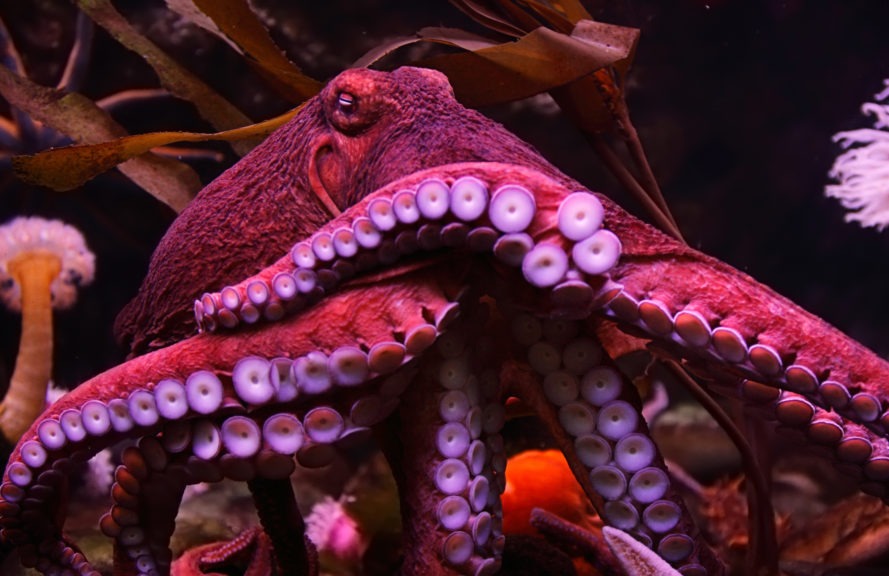
The paper says that in the past 500-million years of cephalopod evolution, compared to their closest relatives, the more primitive nautiluses and other mollusks, octopuses are light years ahead. Their advanced traits appeared suddenly on the evolutionary scene, suggesting they were likely to have been “borrowed from a far distant ‘future’ in terms of terrestrial evolution, or more realistically, from the cosmos at large.”
Essentially, the paper offers two explanations for this massive leap in cephalopod evolution: either cryopreserved octopus embryos arrived from space en masse 275 million years ago, or extraterrestrial viruses delivered a suite of genes that hyper-evolved squid to the more advanced octopus.
The implication is that there is a cosmic gene pool from which intelligent life, including our own species, may have been seeded through cometary bombardment.
This theory parallels Terence McKenna’s “Stoned Ape Hypothesis,” which posits that a sudden doubling of human brain capacity, a jump in human intelligence, and the formation of language some 200,000 years ago was catalyzed by psychedelic plants, particularly psilocybin-containing mushrooms. McKenna noted that fungus spores are able to survive eons of drift through space until they find a suitable environment to land.
McKenna’s theory is often derided as a gross oversimplification of human cognitive development, and rightfully so; it’s difficult to imagine that consuming a single fungus could have such a drastic impact on our consciousness. Though neuroplasticity and a rewiring of the brain has been seen as the result of the use of psilocybin.
But the latest octopus argument delves deeper, providing a more solid foundation and a multitude of evidence. Thus far, the paper has survived arduous peer-review, despite being dismissed by the mainstream.
Of course, such a radical, paradigm-shifting argument would be met with criticism, and the authors believe their theory won’t be validated until extraterrestrial life is discovered elsewhere in the universe. But until then, maybe we should be looking at our aquatic, tentacled friends a bit closer.
Who Are the Arcturians and How to Contact Them

The Arcturians are highly evolved star beings from the Arcturus star system. Known for their great wisdom and spirituality, they have influenced the spiritual and technological development of humanity. In this article, we explore who the Arcturians are, their history, characteristics, and how it’s possible to contact them.
Table of Contents
- Who Are the Arcturians?
- History and Origins of the Arcturians
- Characteristics of the Arcturians
- Arcturian Codes: What Are They and How Are They Used?
- The Influence of the Arcturians on Human Development
- How to Contact the Arcturians
Who Are the Arcturians?
The Arcturians are a highly advanced race that comes from the Arcturus star system, one of the oldest and most evolved systems in our galaxy. Their civilization has reached levels of consciousness and technology far beyond human standards. These beings are renowned for their deep wisdom and spiritual abilities, which they use to guide and assist other civilizations in their evolution.
The Arcturians often present themselves as beings of light, with an ethereal and luminous appearance. They are masters in the manipulation of energy and vibrational frequencies, enabling them to heal and transform matter and consciousness. Their primary mission is to help raise the vibration of the universe and support the ascension process of other star races and planetary systems.
In the series Initiation, available on Gaia, Matías De Stéfano explores the influence of the Arcturians on the evolution of humanity. De Stéfano describes how these beings have guided humanity from its earliest days, providing knowledge and technologies that have been crucial for our spiritual and technological development.
History and Origins of the Arcturians
The history of the Arcturians goes back millions of years to a time when their civilization achieved spiritual enlightenment and mastery of energy technology. Originating from the Arcturus star system, it is believed that these beings have existed long before the formation of Earth, dedicating their existence to exploring and assisting other life forms in the cosmos.
Throughout their evolution, the Arcturians have developed a deep understanding of energy and spirituality. They use this wisdom to help other civilizations reach their fullest potential, teaching them to live in harmony with universal laws. Their culture is centered on peace, wisdom, and selfless service, making them ideal guides for developing races.
The influence of the Arcturians on Earth began thousands of years ago, when they made contact with early hominids. Through their guidance, early humans began to develop spiritual abilities and understand the complex energies of the universe. This collaboration has been fundamental to the evolution of human consciousness, leaving an indelible mark on our spiritual and technological development.
Characteristics of the Arcturians
The Arcturians are beings of great wisdom and advanced abilities, distinguished by their unique physical and spiritual traits. These characteristics have made them guides and protectors of various civilizations in the universe, including Earth.
- Physical appearance: Arcturians are tall and slender beings with bluish or greenish skin. Their large, almond-shaped eyes reflect their ability to see beyond the physical.
- Telepathy: They possess highly developed telepathic abilities, allowing them to communicate with each other and other species without words. This facilitates deep understanding and direct connection with others’ intentions and thoughts.
- Energy healing: Arcturians have advanced skills in energy healing. They use cosmic energy and vibrational frequency to heal diseases and balance the body and spirit’s energies.
- Advanced technology: Arcturian technology is highly advanced, surpassing the limitations of current human technology. It includes spaceships capable of traveling through dimensions and devices that manipulate energy with precision.
- Ancient wisdom: They have profound knowledge of universal laws and the structure of the cosmos. This wisdom allows them to guide other civilizations in their spiritual and technological evolution.
- Connection with higher dimensions: Arcturians can access higher dimensions of existence. This connection provides them with a broad, multidimensional perspective of the universe and life.
- Galactic protection: They act as guardians and protectors in the cosmos, ensuring that developing civilizations follow a path of peace and harmony. They intervene when necessary to maintain balance and prevent destructive conflicts.
Arcturian Codes: What Are They and How Are They Used?
Arcturian Codes are geometric symbols and numerical sequences transmitted by the Arcturians, designed to facilitate healing and spiritual evolution. These codes contain specific vibrational patterns that interact with human DNA and the body’s subtle energies, promoting alignment with higher frequencies and activating latent spiritual abilities.
These codes are used in various spiritual and therapeutic practices. Integrated into meditations, visualizations, and energy healing sessions, Arcturian Codes help release energy blockages, heal traumas, and elevate personal vibration. Practitioners worldwide use these codes to enhance their spiritual growth and connection with higher dimensions.
The application of Arcturian Codes varies depending on individual needs. They can be used to activate the pineal gland, improve connection with the higher self, and access the Akashic Records. Regular use can lead to greater spiritual clarity, expanded consciousness, and a deep sense of peace and alignment with the divine purpose.
The Influence of the Arcturians on Human Development
The Arcturians have had a significant influence on humanity’s spiritual and technological evolution since the earliest days of human existence. These advanced beings have provided crucial knowledge about energy and healing, enabling early humans to develop spiritual abilities and a deeper connection with the universe. Their guidance has been fundamental to humanity’s well-being and ongoing evolution, helping to lay a solid foundation for spiritual growth and energetic balance.
Throughout history, the Arcturians have collaborated with other star races to ensure that Earth follows a path of peace and positive development. Their intervention has been critical during times of crisis, helping humanity overcome challenges and maintain balance during periods of change and transition. This interstellar cooperation ensures that the Arcturian influence remains a stabilizing and evolutionary force for humanity.
Are There Arcturians Incarnated on Earth?
Yes, there are Arcturian beings incarnated on Earth, living among us as human beings. These Arcturian souls choose to incarnate in human bodies with the mission to raise the planet’s vibration, impart spiritual wisdom, and facilitate the evolution of collective consciousness. These incarnations are often deeply inclined toward spirituality and service to others, contributing significantly to energy healing and the expansion of consciousness on Earth.
How to Contact the Arcturians
Contacting the Arcturians requires a focused approach and spiritual openness. Below is a detailed method to establish a connection with these beings of light through meditation:
- Choose a quiet place: Find a space where you won’t be interrupted. Ensure it is clean and organized.
- Set the mood: Use candles, incense, or soft music to create a relaxing and inviting atmosphere for meditation.
- Sit comfortably: Choose a position that allows you to keep your back straight. You can use a chair or a meditation cushion.
- Breathe deeply: Inhale slowly and deeply through your nose, fill your lungs, and exhale slowly through your mouth. Repeat this several times until you feel completely relaxed.
- Visualize a blue light: Imagine a bright blue light surrounding you completely. This blue light represents the energy of the Arcturians, protecting you and connecting you to them.
- Maintain the visualization: Feel how this blue light penetrates your body, filling you with peace and serenity.
- Ask for assistance: Mentally or aloud, request the presence and guidance of the Arcturians. You can say something like: “Arcturians, beings of light and wisdom, I ask for your guidance and assistance at this moment.”
- Feel their presence: Stay in this invocation, sensing the energy and presence of the Arcturians around you.
- Remain silent: After invoking the Arcturians, remain in silence and be open to receiving messages. Pay attention to any thoughts, images, or sensations that arise.
- Don’t judge: Don’t dismiss any perception, no matter how subtle it may be. Often, the messages are delicate and gentle.
- Close the meditation: When you feel it’s time, thank the Arcturians for their guidance and assistance. You can say something like: “Thank you, Arcturians, for your loving presence and wisdom.”
- Take notes: Write down any messages or experiences in a spiritual journal. This will help you interpret and deepen your understanding of the teachings received.
This meditation method can help you establish a deep connection with the Arcturians, facilitating the reception of their guidance and spiritual wisdom.



